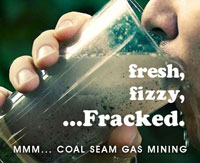
| No Gas Fracking Way! | 23 May 11 |
 New scientific studies are placing natural gas extraction via "fracking" - a method to create fractures that extend from a borehole into rock formations - under fire.
New scientific studies are placing natural gas extraction via "fracking" - a method to create fractures that extend from a borehole into rock formations - under fire.A May 2011 Duke University study found that methane levels in private water wells are, on average, 17 times higher when within 1,000 yards of a natural gas drilling site. The study was instantly criticized by the natural gas industry, citing lack of baseline reference data. Ironically, however, the natural gas companies have much of the needed baseline data, but refuse to release it. "I asked them for the data and they wouldn't share it," said Robert Jackson, one of the Duke study authors. Several other recent reports have warned of the dangers of natural gas fracking. A March 2011 Cornell University Study estimated the greenhouse gas emissions associated with fracked gas are 20% to 50% higher than emissions from coal. A January 2011 research study by the U.S. Environmental Protection Agency showed that methane releases from the hydraulic fracturing of shale gas were 9,000 times higher than previously reported. The release of the studies could immediately shape the increasingly intense public debate over drilling and hydraulic fracturing. France is on track to be the first country to ban hydraulic fracking. Quebec implemented a partial ban, pending further study, following recommendations of a government commissioned report. A provincial review of fracking is scheduled in Nova Scotia. View May 17, 2011 ProPublica articleView May 11, 2011 Financial Times article View May 9, 2011 Proceeding of the National Academy of Sciences article View April 20, 2011 Tyee article View April 16, 2011 Real Climate article View April 11, 2011 Council of Canadian article View April 4, 2011 Government of Nova Scotia press release View March 13, 2011 Cornell Study (PDF) Source:
ProPublica, Council of Canadians
|
|
 Print version Print version |
Top |
